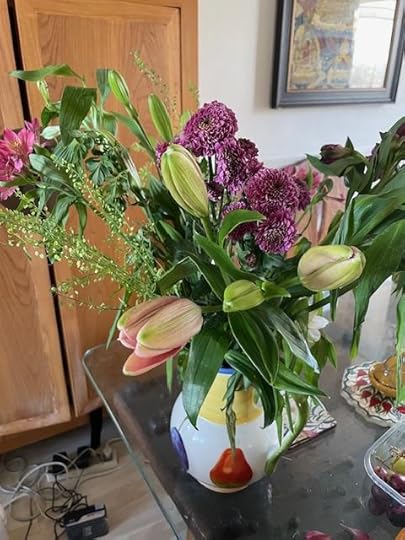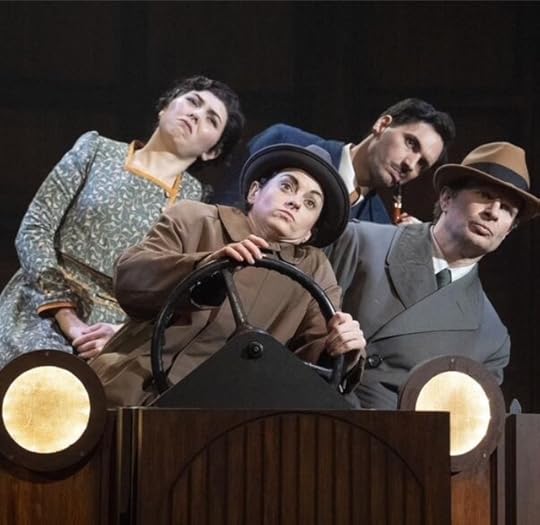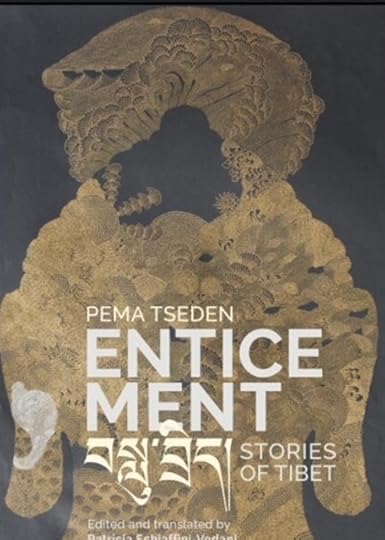Lijia Zhang's Blog, page 8
April 9, 2025
Banquet
Fuchsia Dunlop’s latest book, Invitation to a Banquet, is a fitting title for one of the world’s foremost experts on Chinese food culture. Last night, she extended that invitation in real life—hosting a small, exquisite dinner at Taste of Chongqing, a beloved Sichuan restaurant tucked near Russell Square in London. Around the table were Amitav Ghosh, the distinguished novelist, his writer-wife Debbie, and myself. Amitav is currently in town to promote his new book, Wild Fiction, a collection of essays exploring the theme how we tell our stories and our entanglements with the world around us.
And what a banquet it was! Four artful starters led the way, followed by nearly a dozen courses and a final flourish of fruit. Each dish arrived perfectly executed, layered with flavor, fragrance, and texture. Amitav was especially taken with the slow-cooked pork resting atop a tangle of spicy noodles, as well as the fried garlic ribs, crackling with heat and crunch. Debbie delighted in the pickled lotus root and the velvety slices of beef swimming in a golden broth. I found myself returning again and again to the tiger prawns, glossed in salted duck yolk, and the delicately steamed fish crowned with a glistening heap of chopped chilies. Fuchsia, I believe, loved everything.
Naturally, conversation wandered through the expected terrain—politics, Trump’s tariffs, the US–China relations—but it always circled back to food. We are all, after all, unapologetic food lovers. Fuchsia observed, with a twinkle, that she could tell Amitav was a fellow gourmand from the way he writes about meals in his novels—meticulously, sensuously. Amitav responded with his signature booming laugh.
The banquet itself was the work of Master Fu Bing, the restaurant’s head chef and Fuchsia’s former classmate from their culinary school days in Chengdu, donkey’s years ago. Naturally, we peppered him with questions. How had he made this, and what inspired that? He explained, with understated pride, that many of his dishes were riffs on tradition—deeply rooted, but always evolving. The steamed fish, for instance, replaced the classic blanket of chilies with a mixture of finely chopped ham and bamboo shoots. And the radiant golden hue of the fatty beef? That came from a pickled spicy yellow pepper sourced from Hainan, stirred through with crushed radish for balance and bite.
It was a banquet to remember.
April 1, 2025
Another interview
Exciting news! I recently sat down for an interview with China Underground, where I shared my thoughts on writing, feminism, and my role as a bridge between China and the world. We discussed my journey as a columnist and public speaker, as well as the themes that drive my work.
You can read the full interview here: https://www.google.com/url?q=https://china-underground.com/2025/03/30/lijia-zhang-columnist-and-public-speaker-a-communicator-between-china-and-the-world/&source=gmail&ust=1743580825715000&usg=AOvVaw2ARwM8Vsmxr7mN2muujOHS Let me know your thoughts.
March 30, 2025
Mother’s Day
My joyful day was complete.
No sooner had I returned home from my wonderful outing than a bouquet arrived—Mother’s Day flowers from my daughters. How lucky I am.
Thank you, Mei and Kirsty—not just for the flowers, but for the gift of you in my life.
A happy day
What a lovely day—not just for the sunshine, but for everything it held.
This morning, I took a long walk along the Thames with my friend Iris, who teaches Chinese culture. The air was warm, the river shimmered, and the pleasure of unhurried conversation made the world feel expansive. Afterward, we wandered into the Tate Modern, exploring Materials and Objects, a fascinating exhibition showcasing the ingenious ways artists transform everyday or unusual materials into something extraordinary.
For lunch, we found a 砂锅 (sha guo) clay pot restaurant tucked behind the museum, where we savored a hearty meal, the kind that warms from the inside out. As always, Iris, with her boundless generosity, surprised me with gifts—a cloth handbag and a beautifully tailored Chinese-style shirt.
Afterward, we settled on a bench outside the Tate, sipping tea and nibbling on the Chinese cakes Iris had brought, while St. Paul’s Cathedral loomed across the river, bathed in the soft afternoon light. A perfect moment, held in time.
March 20, 2025
Mei in Colchester
Friends in Colchester and Even London:
Yesterday, I found myself trailing after my elder daughter Mei—the actress, the star—in a maternal supporting role all the way to Colchester. She’s in The 39 Steps, currently on at the Mercury Theatre, and very much enjoying her time on and off stage.
Mei is staying with the wonderfully generous Nelleke, a school friend of my dear friend Helen Wing (who herself hails from Colchester). The kindness! Nelleke kindly opened her home to someone she’d never met. I had the pleasure of taking Nelleke and her husband both out for a meal and a long, meandering chat, the kind that leaves your cheeks sore from smiling.
If you’re in London and fancy a dash of theatre and history, hop on a train—Colchester is less than an hour away. The city is rich with stories: Roman walls, the largest Norman keep in Europe (Colchester Castle Museum), and streets that wind past glorious Tudor houses, looking like they’ve stepped straight out of a costume drama. Tickets here:
https://www.mercurytheatre.co.uk/
March 9, 2025
IWD
It was a pleasure and honour to be included in “Planet China’s” special edition to celebrate the International Women’s Day.
https://china-underground.com/wp-content/uploads/2025/03/Planet-China-2025b.pdf
March 8, 2025
Mei in a comedy
Mei in The 39 Steps
What a riot! A comedy version of The 39 Steps!
I’ve seen Hitchcock’s spy thriller, loosely based on John Buchan’s 1915 novel of the same name—a film many consider one of the greatest of all time. How anyone could turn it into a comedy, I had no idea. And yet, Patrick Barlow pulled it off with a gloriously absurd stage adaptation.
This weekend, I made the pilgrimage to Salisbury Playhouse to see it. How I loved it, not just because my daughter was in it (though that certainly helped).
What’s unusual about this show is that it has only four actors. The charming and charismatic Richard Hannay is played by the equally charming and charismatic Mateo Oxley. My beautiful daughter, Mei Mei MacLeod, tackles multiple roles: Annabella (the doomed femme fatale who flirts with Richard before meeting her untimely end), Pamela (his love interest), and Margaret (a sweet but doomed farm girl). She also moonlights as a radio presenter. Meanwhile, the other two actors play… well, play everyone else.
The result? A fast-paced, laugh-out-loud spectacle with barely a moment to catch your breath.
Naturally, I made sure everyone within earshot knew that my daughter was in the show. One of the ushers told me afterwards that last night’s performance had been the best yet. “Why?” I asked, brimming with maternal curiosity. “Because of the audience,” he said. I nodded knowingly. After all, I had single-handedly contributed to the evening’s success by sitting in the front row, laughing and clapping with unbridled enthusiasm.
Later, Mei told me she could hear my laughter from the stage—an experience that was both encouraging and, in her words, slightly distracting. Still, she agreed with my expert assessment: last night’s performance was the best.
Tonight was the last show in Salisbury, but The 39 Steps will be heading to Colchester this Tuesday. If you have the chance, go see it. Remember to laugh and clap loudly!!!
Changing role of Chinese women
Happy International Women’s Day!
Here’s my piece examining the change role of Chinese women through the intimate stories of my family – my grandma, a courtesan-turned-concubine; my mother, a lowly factory hand and myself. It also discusses the challenges Chinese women are facing today.
https://www.scmp.com/opinion/china-opinion/article/3301243/how-far-chinese-women-have-come-my-grandmothers-time
March 5, 2025
CBR PODCAST
Here’s the link to the podcast I recorded with Alex Ash of China Books Review. I shared my life story, along with those of my beloved grandmother—a courtesan-turned-concubine—and my mother, a lowly factory worker. We also explored the challenges Chinese women face today.
March 4, 2025
Enticement
Enticement, by Pema Tseden
Enticement: Stories of Tibet marks the English-language debut of Pema Tseden, the acclaimed Tibetan writer and filmmaker. I picked up this collection for our Chinese book group—we read books by Chinese writers—and was eager to explore Tseden’s prose, having long admired his films, including The Silent Holy Stones (2005), Old Dog (2011), Tharlo (2016), and Jinpa (2019), which brought Tibetan cinema to international attention.
This collection comprises ten short stories originally written in Tibetan and Chinese between 1997 and 2012, offering a nuanced and deeply personal portrayal of contemporary Tibetan life. Tseden’s narratives weave themes of tradition, modernity, faith, and personal identity into an intricate tapestry, resonating beyond their cultural specificity while remaining unmistakably rooted in Tibet’s landscape and spirit.
The opening story, Orgyan’s Teeth, was my favorite. It follows the evolving relationship between childhood friends, one of whom is recognized as a reincarnated lama. Tseden deftly explores the tensions between faith and skepticism, mirroring a broader discourse on belief and doubt. Similarly, Tharlo portrays a shepherd’s journey into the city, where his encounter with urban life destabilizes his sense of self and tradition. This story was later adapted into an award-winning film, reinforcing its cultural significance.
Tseden’s storytelling blends realism with echoes of Tibetan folklore. A New Golden Corpse Tale: Gun reimagines a classic Tibetan folktale, threading modern elements—such as the presence of a firearm—into the narrative, creating a striking juxtaposition of past and present. That said, I found the ending somewhat predictable.
The collection also touches on the quiet but persistent influence of political and social changes on Tibetan communities. In Eight Sheep, a man grapples with his mother’s death and the transformation of ancestral grasslands due to government policies, a reflection of the broader upheaval traditional lifestyles face under modernization. The introduction of a blond-haired American backpacker adds unexpected humor to the story. Some of the stories, however, felt too brief to be truly satisfying.
Ultimately, I found Tseden’s films more compelling and immersive than his fiction. Yet, this collection remains a valuable glimpse into Tibetan life, offering an authentic and empathetic perspective from one of Tibet’s most important contemporary storytellers.




